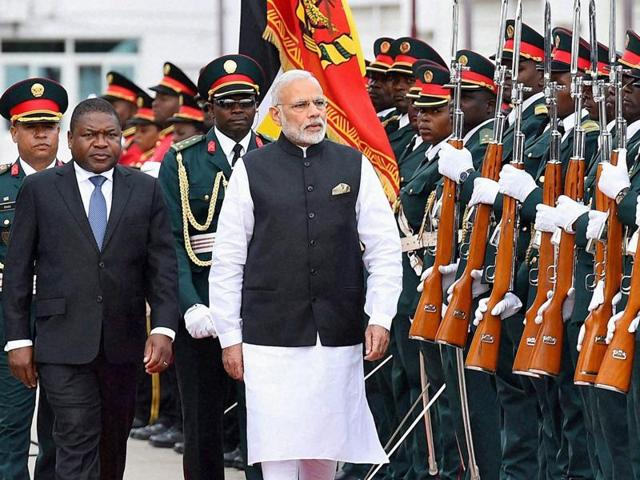“The warm waters of Indian Ocean have served as the bridge between our people”- were the words of PM Modi in Nairobi, Kenya’s bustling capital in the Savannah. An Indian Premier was setting foot in Kenya after 25 years; it was the last stop in the itinerary of the PM’s 4 nation tour comprising Mozambique, South Africa and Tanzania.
The purpose of the tour has been perceived by many as business-as-usual- “deepening economic ties”, “counter terrorism”, “interacting with the Indian diaspora” , among others. Indeed, all the elements of bilateral relationship were on the table. However, a quick glimpse at the geographical location of the 4 south-eastern African nations gives a sharp geo political angle to the tour. The western seaboard of Indian Ocean is flanked by these 4 rather well settled nations of Africa.
That said, it would be farfetched to term the tour as purely strategic, considering the broad range of shared objectives the 4 developing economies have with India. On the flip side, it would be naïve to undermine the rich strategic opportunities both the sides can reap from a deeper economic engagement. It is here that the diplomatic jargon of ‘geo-economics’ come to the picture. There is no better example of delicate geo-economic partnership than India’s engagement with Mozambique.
Since 2015, the NDA Govt. took the initiative to ramp up a hitherto dormant defence relationship with Mozambique. One more glance at the map will us why. A lengthy coastline of 2470 km makes Mozambique an imperative partner for India’s efforts towards consolidating the maritime security architecture in the Indian Ocean region.
Mozambique has seen unprecedented engagement with India for the last couple of years, wherein sectors ranging from hydrography to agribusiness has seen cooperation. In addition to this, India has also extended a line of credit for a power supply project in its capital Maputo. Along similar lines, there has been a renewed vigour towards defence cooperation with South Africa.
Rumours regarding South Africa’s role in opposing India’s entry to the NSG has been put to rest with Modi stating in the joint media interaction with South African President Jacob Zuma that “[…] we can count on the active support of our friends, like South Africa”. It is, howsoever, safer to expect South Africa to be hesitant on the issue, considering its strong disarmament policy and the fact that India is not a signatory to the NPT.
In this context, we come across the China factor. Like it or not, the dragon has forayed into the African landscape through its own version of ‘South-South’ cooperation initiative. It is also part of the reality that China enjoys a whopping $60 billion trade with South Africa compared to India’s paltry $9 billion engagement. It goes without saying that this influence might have helped China take South Africa on board in blocking India’s entry into the NSG.
Besides, the recent gruesome incidents of racist attacks against Africans in Indian cities is not helping either. India’s strategic community pins its hope on the fact that Modi is no Nehru. Nehru’s discussion on non-alignment and socialist policies with Mandela has been replaced with Modi’s discussions with Zuma on the opportunities that India’s fledging defence manufacturing sector has opened up. Realpolitik has replaced abstract ideals.
As new vistas of cooperation are unlocked, the NDA Govt. is slowly harnessing the untapped potential of India to play the lead role in knitting together the maritime alliance of the Indian Ocean Rim Association members, or the IORA states, comprising nations in the Indian Ocean with shared strategic interests.
The Africa tour is to be seen as part and parcel of the larger picture of ramped up cooperation and investments with IORA States like Maldives, Mauritius and Seychelles- nations for whom India has already become the ‘net provider of security’ through sale of warships, joint naval exercises and port development. Our relationship with Africa goes beyond this.
Unlike the case with China, India is not perceived as a Big Brother who has come in search of investment opportunities in trade and energy resources. African nations have, for long seen India as a peer- facing the same demographic challenges, trying to cope up, first with a post colonial and then with a globalized world. India walks beside Africa.
